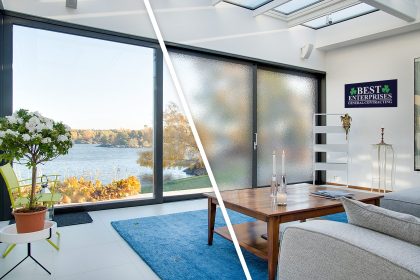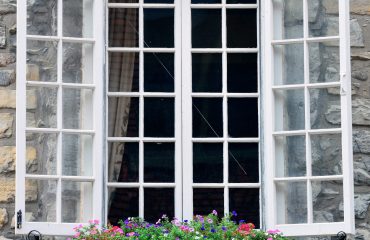
Windows have transcended their traditional roles of providing light and ventilation. Today, they are at the forefront of technological innovation, enhancing both aesthetics and functionality. One of the most groundbreaking advancements in this domain is smart glass technology. This blog delves into the world of smart glass, exploring its workings, benefits, applications, and the transformative impact it has on modern homes.
Traditional windows, long valued for providing light and views, are now being revolutionized by smart glass technology. This cutting-edge innovation is set to transform how we see the world from our homes and manage energy efficiency and comfort within them.
What is Smart Glass?
Smart glass is a dynamic glazing technology that changes how much light passes through when voltage, light, or heat is applied.You can control this transformation manually, automatically, or through a smart home system, offering greater flexibility and ease of use. Smart glass technology is often associated with Energy Star windows due to its significant energy-saving potential.
Types of Smart Glass:
- Electrochromic Glass: Changes color or opacity in response to an electrical current. It changes tint when you apply electrical voltage. It offers precise control over light and heat entering a space, making it ideal for energy-efficient homes. The price of electrochromic glass can vary, but it is generally higher due to its advanced technology. It’s popular for its controllability and precision.
- Thermochromic Glass: This glass changes its tint in response to temperature changes. It is a passive technology that does not require electrical power, making it a cost-effective option for certain applications.
- Photochromic Glass: Similar to transition lenses, this glass darkens in response to sunlight. It is particularly useful for reducing glare and UV exposure.
These technologies collectively contribute to the growing popularity of energy-efficient windows, such as Energy Star windows, which help reduce energy consumption and enhance indoor comfort.
Benefits of Smart Glass
1. Energy Efficiency and Cost Savings
One key advantage of smart glass is its ability to improve energy efficiency. By optimizing natural light and heat, smart glass significantly reduces the need for artificial lighting and air conditioning. This leads to substantial energy savings and lower utility bills, aligning with the principles of Energy Star windows.
2. Improved Comfort
Smart glass enhances indoor comfort by reducing UV exposure and glare. It maintains a consistent indoor temperature, creating a more pleasant living environment. Additionally, by minimizing glare it ensures that you can enjoy natural light without the drawbacks.
3. Enhanced Privacy
Smart glass offers privacy on demand. Smart glass can switch from transparent to opaque, providing privacy without curtains or blinds. This feature is particularly beneficial for bathrooms, bedrooms, and street-facing windows.
Applications of Smart Glass
1. Residential
In homes, smart glass is used in windows, skylights, and doors. It allows homeowners to control their environment, enhancing comfort and energy efficiency.
2. Commercial
In commercial settings, smart glass is utilized in office buildings, storefronts, and conference rooms. Its ability to create adaptable work environments and impressive displays makes it an attractive option for businesses looking to enhance aesthetics and functionality. It provides privacy on demand and contributes to a modern, sleek aesthetic.
Installation and Maintenance
1. Installation Process
The installation of smart glass involves several steps, including measuring, cutting, and fitting the glass panels. It is crucial to work with experienced professionals to ensure proper installation and integration with existing systems.
2. Maintenance Tips
Smart glass requires minimal maintenance. Regular cleaning with non-abrasive materials and periodic checks of the electrical components (for electrochromic glass) will ensure longevity and optimal performance.
Cost Analysis
Initial Investment vs. Long-term Savings
While the initial investment in smart glass can be higher than traditional windows, the long-term savings in energy costs and the potential increase in property value make it worthwhile. Reducing heating, cooling, and lighting expenses further enhances the return on investment (ROI).
Case Studies/Examples
Showcasing Best Enterprises Projects
Best Enterprises has successfully implemented smart windows in various residential projects, showcasing the technology’s transformative impact. Homeowners have reported significant improvements in energy efficiency and overall comfort. One notable project involved the installation of electrochromic windows in a modern home, resulting in a 30% reduction in energy costs and enhanced living comfort.
Testimonials
Homeowners and builders alike have praised the benefits of smart glass. One homeowner noted,
“The smart windows have reduced our energy bills and added a modern touch to our home. The ability to control privacy and light at the touch of a button is truly revolutionary.”
Conclusion
The future of home design is undoubtedly intertwined with smart glass technology. As this technology continues to evolve, it promises to bring even greater energy efficiency, comfort, and aesthetic appeal to homes. Embracing smart glass is not just a trend but a step towards a more sustainable and intelligent living environment.



